March 15, 2018
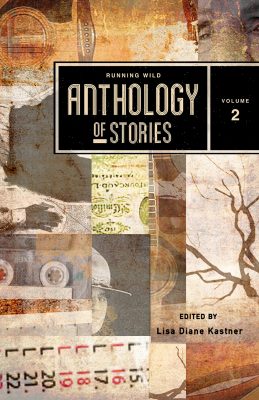 How can you not love this cover for the Running Wild Anthology of Stories?
How can you not love this cover for the Running Wild Anthology of Stories?
Today’s the day!
The Running Wild Anthology of Stories (Volume 2) releases to the world today, and of course I think you ought to pick up a copy. I mean, we all know I like to release new fiction on my birthday and so what if we’re a month early? Your reading my creation is the best gift you can give me.
Here are the buy links:
Amazon
B&N
Rakuten/Kobo
iTunes
And remember: leaving reviews is the best way to show appreciation for an author’s work. And yes, negative reviews, when thoughtful and considered, are beneficial.
I do have digital copies if you PROMISE to leave a review anywhere online, including GoodReads.
March 12, 2018

It’s my turn to step into the spotlight! Do you know stoked I am to do this?
Here’s the story, if you missed it a few weeks ago: One of my son’s friends told me about a prompt on their English final. One word: Puddles.
And after years of not writing a heck of a lot, just like that, I started writing again.
I still don’t know what motivated me, but something did. Maybe I was possessed, maybe I just loved this story and had that much faith in it.
But… I submitted it, it was accepted, and now, today, I’m here to tell you about the song that makes me think of my story, Undaunted.

This is embarrassing as hell, because I’ve come to realize this is actually a horrible song, but here it is anyway: It Can’t Rain All the Time, from the Crow Soundtrack, performed by Jane Siberry. The link will take you to a fan-made tribute video, and I think it does the song and movie justice. But… yeah. It’s not the sort of thing I listen to… ever. But there’s a longing in it, a sense of what true love must be like, and even a promise — and those elements are what I tried to key into when creating Carrie and this story of her loss of her husband, Dante. And, of course, the rain is a theme in both song and story — in Undaunted, though, it’s more an element of the safe harbor of love, and in the end, it’s all about redemption and freedom.
The description isn’t much, as it shouldn’t be in an anthology such as this, but here it is:
Over twenty stories that will make your heart race, make you joyful, fearful, thrilled, inspired, and horrified.
These are stories that will make your imagination run wild featuring Gemma L. Brook, Lorna Walsh, Jasmine Wade,
Laura Nelson Selinsky, Carol Dowd-Forte, Tone Milazzo, Julie Doherty, Tori Eldridge, Ken MacGregor, Nick Mazzuca, Andrew Adams, Susan Helene Gottfried, Amelia Kibbie, Lexis Parker, Rebecca House, Elan Barnehama, Gary Zenker, Suzanne Grieco Mattaboni, Joe Nasta, Cindy Cavett
Need some buy links? It’s still a pre-order for three more days. But go and pre-order. Don’t wait, to make sure you don’t forget!
Amazon
B&N
Rakuten/Kobo
iTunes
And… you don’t really need my connect links… they’re all over this here site.
Just remember that if you pick up a copy (and you should!), my fellow authors and I would LOVE a review.
March 6, 2018
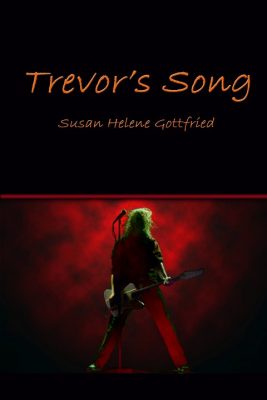 Trevor’s Song as part of Read an Ebook Week again this year.
Trevor’s Song as part of Read an Ebook Week again this year.
Can’t wait for the Running Wild Anthology of Stories to come out with my newest creation, Undaunted, in it?
Me. Either.
But there’s a nice way to tide you over for the next not-quite-ten days. It’s Read an ebook Week over at Smashwords, my favorite of the ebook retailers. (They pay the best royalties out there, if you’re wondering why they are my favorites. And they do NOT play the games that certain big retailers do. Ahem.)
So between now (well, it started on Sunday the 4th but man, have I been busy, between an unusually busy March and the launch of the Running Wild Anthology of Stories) and March 10, ALL of my previous books and stories will be FREE over at Smashwords. If you want to get some short story reading in between now and the release of Undaunted, I recommend Broken or any of the Demo Tapes anthologies.
(If you’re looking for Mannequin, one of my favorite stories, it’s over at Wattpad now, along with a never-before story from the Trevolution.)
So… have at it. Happy reading. Discover something new while you’re at it.
And don’t forget: reviews help sell books, so leave 2c worth of thoughts about what you liked and didn’t like. Yes, even one-star reviews are valuable, so don’t be afraid to say you didn’t like something.)
And pre-order Undaunted and the rest of the anthology, why don’t you?
Amazon
B&N
Rakuten/Kobo
iTunes
March 5, 2018
 Let’s welcome Frank Oreto to West of Mars this week!
Let’s welcome Frank Oreto to West of Mars this week!
Frank’s got a few things that make him pretty cool: he’s local to me, part of a writer’s group I belong to and will one day make an in-person appearance to, AND he’s got a short story to tell you about. I know we’ve got some other short stories featured in the spotlight in the upcoming weeks, so stay tuned and expand your literary buying habits now!
So Frank’s got a short story called All God’s Creatures Got Reasons, and it’s in the Hinnom Magazine, #5. I’ve never heard of this magazine, so you KNOW it’s time to investigate and learn about it.
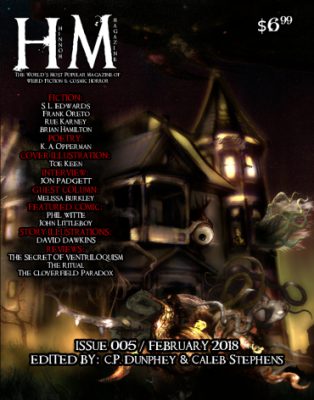
But first… Frank, what song makes you think of your story?
“Yummy Yummy Yummy I Got Love in My Tummy” for the most horrible reasons imaginable.
Oh.
My.
I’m… scared now. Which I suppose I ought to be, given that this is a group who’s pretty hard-core Science Fiction, Fantasy, and horror. I mean, this is the source of that way-cool pizza-themed call for submissions I posted a few months back.
(Know what’s worse? When I dug up the song on YouTube, I recognized it! I am NOT that old. I mean, really. I am not. I just know weird shit.)
So. Back to Frank and his story because to be honest, I need to get myself a copy of this. I mean, don’t you? Between the title and the song, how can you resist?
But if you’re still on the fence, here’s how Frank describes the story:
We’re all heroes in our own story. But what happens when what you do, the act that gives you purpose, makes you the worst person in the world? Find out in “All God’s Creatures Got Reasons.” Featured in Hinnom Magazine #5. Available now.
Yeah, it’s hard to summarize a short story, but now I’m even MORE intrigued. Who gets eaten? Who’s the hero? What’s this about God’s creatures and reasons?
Seriously.
Let’s ALL get a copy. It’s an Amazon-only thing, I think, but if you’re more Amazon-averse than I am, let me know if you find other retailers and I’ll update.
March 1, 2018
 I am beyond proud to introduce you to the Running Wild Anthology of Stories, Volume 2!
I am beyond proud to introduce you to the Running Wild Anthology of Stories, Volume 2!
Know why?
I have a short story in it.
But not just any short story. Undaunted, it’s called, and it’s one of those pieces of writing that just pours out of you from places unknown, almost entirely whole and coherent, and requires very little revision and a light touch by an editor to tighten up a few phrases.
It’s not just any short story. It’s the first new fiction I’ve been willing to show the world. It’s the first short story I have submitted for publication in years.
So, yeah. I’m batting 1000% on submissions over the past year or five. Time will tell if I can keep it up, but for now, I’m grateful to the team behind the Running Wild Anthology — yes, you guessed it: it’s the cool people at Running Wild Press. This is an emerging publisher worth keeping an eye on, folks!
February 27, 2018
 An anthology I have a story in, of course!
An anthology I have a story in, of course!
I’ve posted about the Hot Metal Press before. I’m partial to them because they are local to me, and to be honest, if I get the time to polish something up, you just may have some friendly competition for a spot in this awesome literary magazine. (And yes, despite my roots at Pitt, I am eligible to submit, as the Hot Metal Press did not, to the best of my knowledge, exist back when I was there. You know. In the Pleistocene Epoch. Which means I couldn’t have been on the staff.)
So what are they looking for? Fiction, Nonfiction, Poetry, and Visual Art.
They are NOT a paying market. But their byline looks cool, and one can never have too many publications on one’s longtail of publishing accomplishments.
They also have very defined tastes… sort of:
We want to read fiction that turns out heads to show us a new perspective. Be it through formal invention, depth of insight, or strength of narrative, the fiction that grips us does so by revealing a little sliver of some idiosyncratic, particular human life. But we don’t want to get too specific here: we want your best story—your ire, your lore, your comic relief—whatever form it may take.
Keep it under 6k words, and good luck!!
As always, if you submit, let me know. And if you submit and are accepted, definitely let me know so I can brag about it and help spread the word and hopefully get more eyeballs on your work. (And remember, submissions for the Featured New Book and/or Lines of Distinction ARE welcome if you’ve published a short story.)
Go for it! Here’s the link you need, to Submittable.
Good luck!
February 21, 2018
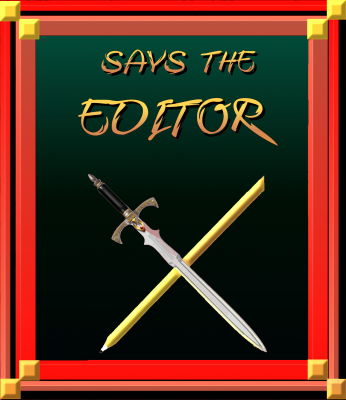
So I’m reading this book. It’s too early to say if it’s a good book, but the author is well celebrated, and I’ve followed her on social media for years. She’s had a hell of a career, the sort that anyone would be envious of and strive to emulate, even when writing in other genres and categories.
But… the second chapter is set in 1999. As in the year 1999. And something I encountered stopped me cold.
I laughed because why not.
What’s wrong with that, you ask. People talk that way all the time.
Except… in 1999, they most certainly did NOT. That construction is much, much newer than 1999. I’d say it’s newer than 2009, even. I’d cautiously put money down on the year 2012. Somewhere in there.
Regardless, pulling your reader out of your story isn’t exactly what you want to be doing if you’re the writer. And you really don’t want them jerking out for something so… small.
I know… most people won’t catch this. Even more won’t think it’s a big deal. You may be among those.
A lot of readers don’t care that certain historical fiction authors aren’t even close to the facts. That doesn’t mean authors can willy-nilly abandon their obligation and the readers’ expectation that their historical fiction is accurate and authentic.
But there are readers who do care. About phrases that were and weren’t used at the end of the Twentieth Century. About the accuracy of historical novels. About authenticity and the trust they put into an author to present the world as it was in whatever year they’re writing about, be it 1999 or 1899.
So who do you cater to? How do you choose?
Well, you do your best. You make sure you’re working with a team who will catch these small things. If you can’t be sure your editor will, do your best to find beta readers who will.
All you can ever do is your best. Sometimes, it’ll bite you. Sometimes, it’ll save you.
Do your best. And yes, stop and think about how people used to talk. You’ll be surprised to see what’s entered our language over the past few years alone.
February 19, 2018
 Let’s welcome Carol Roberts to West of Mars!
Let’s welcome Carol Roberts to West of Mars!
You guys are really writing cool stuff (and listening to music I’d never discover on my own) and you knock my socks off. I am continually impressed with what comes out of your imaginations.
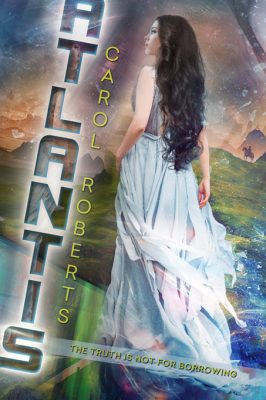
So, Carol, what song makes you think of your book?
‘Crazy’ by Gnarls Barkley. Why: Because when the song came out, I thought, yes, I have been listening to echos of emotions for a long time; I am about to go crazy, but I am still going to write about what I have been hearing. I was definitely out of touch with reality when I wrote ‘Atlantis’, caught up interpreting my condition, and at the same time trying to understand the underlying meaning of mythical literature. What could be important enough to survive the ages as myth? Does it want to tell us something about ourselves, our destiny, the challenges evolution has thrown at us, our choices? ‘Crazy’ helped me to forget about what people might think, and put into writing what I ‘knew too much of’.
Okay, anyone else absolutely fascinated by that answer? WOW.
Here’s what the book is about:
When Alanthea, high-priestess of Atlantis, connects to a woman in her dreams, she becomes haunted by a mystery. Compelled to trace the other woman’s life she finds coded poems that hold clues to the predicament of her people. Now she has to venture ever farther into forbidden territory to link past and present, and understand the real danger threatening Atlantis.
Arakon always thought of himself as an orphan, a loner without any real belonging. But after a strange encounter his life changes, and he is drawn into events beyond his control.
They move parallel in their search for answers until their destinies converge, and the weave unravels. Yet what they finally uncover lies deep at the heart of collective evolution, and what has been set in motion cannot be undone.
I’m fascinated. Are you? There’s so much potential here… I can’t wait to dive in to a copy and see if it lives up to what I’m seeing.
Pick up your own copy! It’s only at Amazon for now, but maybe that will change so you non-Amazon people can have a read, too.
And be sure to connect with Carol, as well. We’ve spoken only a little, but she seems way cool. I’d like to get to know her better. Join me!
Twitter
Book trailer
February 15, 2018
 A fun graphic to start us off!
A fun graphic to start us off!
Because let’s face it: there’s nothing fun about trying to promote your book. With my upcoming anthology release (more on that later), I’m in the same boat: you’ve got to reach people, tell them about your project, encourage them to buy it. It’s thankless work, and it’s hard, not to mention time-consuming.
And because I like to take care of my friends and clients, it’s worth it to me to take the time to pass along word of bloggers who are open to promotional events at their own site.
Like this one. Louise Wise, owner of Wise Words Book Blogger, has openings and opportunities that she’d LOVE to see be filled up. (Sort of how I feel about the Featured New Book Spotlight!) Unlike me, though, she doesn’t have one static question. She’s got a bunch, and they change according to the month you’d like to be featured. Stop in and check out what she’s looking for.
Yes, it’ll take you some time and effort to write a post on these topics. From a blogger’s point of view, I get it: we want fresh content, not recycled stuff. From a reader’s point of view, I get it: we want fresh content, not recycled stuff (and yes, I am thinking of the one best-selling author who wrote three guest posts for one of her books and then flooded the blogosphere with those three. By the time she was done, when I saw her name, I groaned. NOT a way to get someone to buy your book!). But as an author, I also get it because time spent writing yet another unique guest post means time away from fresh material.
Still, I think it’s worth it. You never know how or when you’ll find a new fan, and if you make the right kind of fan — the one who’ll follow you around the Internet and be a magnifier for your appearances without crossing that line into creepy — they are worth ten times their weight in gold. Those are the sorts of fans who’ll sell a hundred copies of your book for you, and they are the kind we all dream about. Admit it.
So… check out what Louise is offering to all of us and if you’ve got the ability to make the time, go for it. I’m certainly going to try — after all, anthologies are HARD to sell.
February 12, 2018

Let’s welcome back Susan Leigh Noble to West of Mars! If you’re paying attention around here, you’ll notice that Susan also features authors on her blog, so it’s nice to be able to pay the kindness back. Or forward. Or whatever.
The end result is that she’s here today to tell us about her new book, Blood Bond. Ready? Susan, what song makes you think of your book?
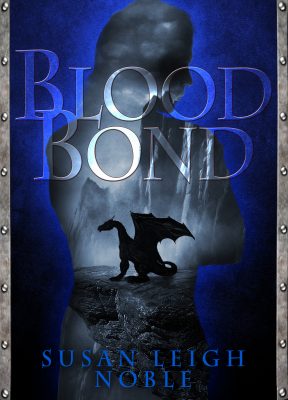
I would like to thank Susan for allowing me to spotlight my new release Blood Bond. I found picking a song that represents my fantasy novel to be a challenge. I finally chose Should I Stay or Should I Go by The Clash.
I felt this song’s title is exactly the question running through my main character’s mind. Soren is reluctant to help Dex, the dragon, who wants him to help reunite man and dragon for an upcoming battle. The line “If I go, there will be trouble and if I stay it will be double” is particularly true to the story. After Dex’s blood mixes with Soren’s during a battle, the two become linked. If Soren decides to leave it will cause both of them pain but if he decides to stay and help not only will the bond get stronger, but he will be putting himself in harm’s way.
Intrigued? I am. The basic premise of staying or going… that’s one we all face, more often than most of us would like to admit.
Here’s the book’s description:
Man severed the alliance with the dragons fifty years ago. But now an invading army marches north destroying everything in its path. The dragons believe only together can the invaders be defeated. They need an emissary.
Womanizer. Drunk. Failure. Soren is many things. A leader isn’t one of them. But, Dex, the dragon that saves him from a cliff, believes different. Thrust into an adventure he never wanted, Soren’s life changes forever when during a battle Dex’s blood mixes with his blood creating a mystical blood bond – forever linking them.
As the bond strengthens, Soren must decide whether to return to his old life or accept the bond and embrace his role in the battle against the invading army.
Whoa, huh?
Pick up your copy. It’s Amazon-only, but Susan said, “right now,” so maybe there’s hope for those of you who choose to use other book retailers than Amazon?
And connect with Susan! Remember to check out her blog for other authors you may know… and those you may not.
Link to my blog
Link to Facebook
February 9, 2018
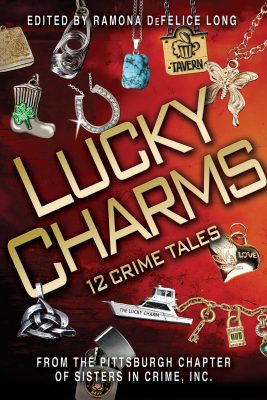 The Lucky Charms anthology was filled by a call for submissions from the members of the Pittsburgh Chapter of Sisters in Crime.
The Lucky Charms anthology was filled by a call for submissions from the members of the Pittsburgh Chapter of Sisters in Crime.
Honestly, I don’t go looking for places that are seeking submissions. They are easy enough to find via Submittable, and that’s a site well worth having an account with. I find all sorts of cool stuff listed there.
But I rarely tell you about them. Rather, I bring to you the calls for submission that I hear my friends and colleagues actively talking about. There’s buzz in my community, and I’m glad to make something buzz a little bit harder and help bring parts of my community together.
Today’s call for submissions, to Delmarva Review, crossed my radar in such a way. And since cool people I know in some form or another (in this case, I believe it was a local writer’s group) are talking about this, it was worth bringing to a wider pool of potential submissions. Because you all LOVE increased competition!
So. Delmarva — that’s a geographical area and while your fiction or poetry doesn’t have to reflect the area, it’s still good to know something about your potential audience. I’ll let you research that and just tell you that they’re looking for fiction of length up to 5k words or flash up to 1k. You may submit two flash pieces, each under that word count.
They don’t pay cash, if that’s your aim. It’s a literary magazine that pays the standard two copies, so this one’s great for exposure and an ever-lengthening list of publications. Don’t discount the value of that list! If you work in short fiction at all, you know how valuable it is.
The deadline is March 31, with publication in October. They hope to get back to everyone by May.
I’ll let you read more about it, like what sort of fiction they’re looking for — and what they’re not.
If you’ve got a piece (or two, if you write flash), go for it! If not, what’s stopping you from creating something? The best part of fiction is that if it doesn’t fit here, it may fit somewhere else.
As always, if you want eyes on it before you submit, drop me a line and I’m glad to help you bring it up to snuff. And as always, if you do submit, let us know. And if you are selected, definitely let us know — not only do we want to cheer you on, we’d love to host you for a Featured New Book Spotlight!
February 8, 2018

I love that you guys are reading my posts and interacting with me and with them. This one, about dialogue tags, in particular has raised a number of questions and responses.
We’ve already talked about asks versus said.
But, another author asked, what about the Tom Swiftlies? Or maybe she spelled it Tom Swiftlys, which I suppose is actually more accurate, if we pretend that SWIFTLY is Tom’s last name.
At any rate, she’s got a point. When we’re talking dialogue tags and the power of the verb we use — ask, said, demanded, emoted, swore — we should also talk about those pesky little adverbs. You know: He said softly. He yelled loudly. He swore aggressively. He stated belligerently.
Notice how these are all TELLING words. They tell us how the speaker did his verb (said, yelled, swore, stated). But do they show?
Go back to the time-worn canon: show, don’t tell. Now, we all know that by and large, this is a truth of fiction. Show, don’t tell.
But we also know there are times when it’s okay, or even better, to tell, don’t show.
How do you know which is the right thing to do when writing dialogue?
For me, this one’s fairly easy, but it involves a lot of trust in your reader (which is where I think a lot of this breakdown occurs. That, or bad sixth grade teachers who thought adverbs with dialogue were all that and more). Can the reader figure out how something is conveyed if you remove the adverb? Yelling is a loud thing. You can’t yell quietly. (Admit it: you tried.) You can be forceful and strong but quiet, but you can’t yell. Even Webster’s agrees:
Definition of yell
intransitive verb
1 : to utter a loud cry, scream, or shout
2 : to give a cheer usually in unison
transitive verb
: to utter or declare with or as if with a yell : shout
Look at that top definition: to utter a loud cry, scream, or shout — see it? By definition, a yell is loud. There’s no need to tell us!
Sometimes, it’s not that cut and dry. You can state things calmly, quietly, belligerently, aggressively… the list goes on. So how do you still convey your meaning yet remove the adverb?
Two ways, and they don’t have to be exclusive of each other. The first is via word choice. Someone being aggressive is going to use a different set of words than someone who is being calm, or even someone being diplomatic. An aggressive lover versus a persuasive lover — “Come here.” versus “If you come over here, I’ll make it worth your while.”
The second way can be a little more challenging, and that’s by showing your speaker’s body language. “Come here” might be accompanied by a hand on a hip and a finger curling in and out, or pointing at the spot in question. The head might be held a little higher, the chest held upright in perfect posture. Contrast that with someone trying to persuade, where the posture won’t be so assertive: the shoulders might be hunched, the head drawn down on the neck. Instead of pointing at the partner or at the space the speaker desires the listener to occupy, maybe the speaker pats the couch beside him (or her). Maybe s/he is sitting, not standing.
There are a million ways to convey body language, and of course, this is a spot — just like those darn pesky adverbs — that can trip you up. Why? How? Didn’t I just say body language is good?
Yes, but too much of it, or when used at the wrong time, and you’ve undermined yourself.
I know. It’s hard. It’s confusing.
Remember, folks, that writing is a CRAFT. Sometimes, what seems vitally important in the early stages of a manuscript’s development becomes fodder for the delete key later on. And often, the reverse is true as you get to know your characters and the situations they find themselves in.
So give it a try. Take a hard look at your writing. Are you a Tom Swiftly? Do you over-adverb your dialogue tags?
If you need help, you know where and how to reach me. I’m here to help, after all. And in the meantime, keep the questions and good stuff coming!
February 6, 2018
![]() It’s a BUSY week here at West of Mars, starting with yesterday’s visit with my client, Carol Kilgore. Stop in and see what I have to say about crowdsourcing your editing.
It’s a BUSY week here at West of Mars, starting with yesterday’s visit with my client, Carol Kilgore. Stop in and see what I have to say about crowdsourcing your editing.
And then pick up the first book in Carol’s new trilogy, Jalapeno Cupcake Wench. I loved working on this with her, and I think if you’re into mysteries, you’ll like this a lot. It’s light, it’s fun– but it’s also thought-provoking and with quite a bit of substance.
Stay tuned. I’m busy with edits, as always, and as always, there’s room in my queue for your manuscript if it’s not already there. But there’s also a lot scheduled to be happening here at the blog over the next couple of weeks, and you won’t want to miss any of that, either.
February 5, 2018
 Let’s welcome Pandora Spocks to West of Mars! If you like your fiction hot and spicy, Pandora’s got some for you!
Let’s welcome Pandora Spocks to West of Mars! If you like your fiction hot and spicy, Pandora’s got some for you!
(If not, well, it takes all kinds to rock the world, and maybe this book would be perfect for one of your friends?)
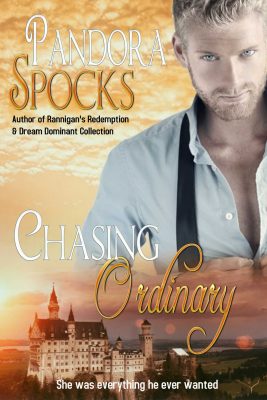
I actually like that the dude on the cover is wearing a shirt. So many erotic romances (and, indeed, many of Pandora’s own books) feature the de rigeur skin that this one… it catches the eye. But it can also be misleading.
So, let’s find out about the book, shall we? Pandora, what song makes you think of your book?
My new book, Chasing Ordinary, is the modern adult fairy tale I’ve always wanted to read. As I was writing, one song echoed through my mind, and it makes an appearance several times throughout the story: Thinking Out Loud by Ed Sheeran.
I have to admit, I was absolutely captivated by the woman dancer in the video.
But this isn’t a post about a song! It’s a post about a book, so let’s find out what Chasing Ordinary is about:
Red-haired Petey Cavanaugh is a sculptor who welds steel and glass creations. A young widow, she lives on her in-laws’ sheep ranch in Montana where she helps out during the day, working on her art at night.
Looking to raise money to expand the ranch’s business, she gratefully accepts her art school roommate’s offer of a gallery show in Manhattan. It’s been years since she was in the city, and she’s happy to visit her old friend.
Nik is in New York on business. He’s been traveling for nearly a month, enduring endless meetings, attending obligatory dinners, and battling jet-lag. On his way to yet another business dinner, his world collides with Petey’s one rainy Manhattan night.
Their mutual attraction is immediate, but Nik’s skeptical. Could it possibly be that this gorgeous, enchanting artist has no idea that he’s Europe’s most eligible prince?
Spending time with Petey is Nik’s first-ever taste of ordinary. What will happen when she finds out the truth?
Nice twist at the end there!
This won’t be released until February 13, but you can pre-order now. (I LOVE pre-orders) Best of all, this link will take you to a variety of retailers, so you can pick from your favorite!
Here’s the link again, in case you missed it the first two times. Because really, if I can’t resist, that means no one else in the world should be able to. (Did anyone buy that garbage I just spewed? Oh, just go buy the book insteaad!)
Remember, once you’ve read it, a few words in review are always appreciated by the author. If you need help writing your review, holler. I charge super-cheap rates to get reviews up to the brilliance you know you intended to write.
And be sure to connect with Pandora, too. As she puts it, “I’m all over the place. Feel free to stalk me!”
Facebook
Twitter
Instagram
YouTube
Website
Book+Main Romance Bites
Bellesa: Porn for Women
Amazon
Authorgraph
Pandora’s Box Unleashed Newsletter: (Sign up and get a free book!)
February 2, 2018

“You threw me off your back while we were in the air! I could have been killed,” Soren seethed as he paced before the dragon.
“And yet, here you are.”
Soren took a deep breath and then another. “What if Dex didn’t save me?”
“Then neither of you would have had to worry about the Blood Bond,” Barth said with amusement in his voice.
***
“What happened, Soren? No, don’t tell me,” Dex said, drolly. “You are being held somewhere…again. I really don’t think you should go anywhere alone.”
Okay, I don’t know who this Barth dude is, but he cracked me up.
Pre-order Susan’s book now! It’ll be released on February 6, and if you preorder the digital edition, it’ll poof! Show up on your Kindle and you’ll be all happy and start reading.
C’mon. You know you want to.
February 1, 2018
 So my post last week spawned some questions.
So my post last week spawned some questions.
The first was about the word ASK. When do you use it, and when do you use SAID?
The author asking that is a writer of wonderful romances and women’s fiction. Her books resonate. They’re best-sellers. They win awards. And yet… she’s brave enough to ask this.
Yay for brave authors who are always striving to improve their craft!
I’ve stalled long enough, haven’t I? I’m not stalling because the answer’s not easy. It actually is relatively easy, for fiction — because you’ll notice that near the end of this, part of my answer is going to be all about context and nuance — but of course there’s a BUT. And this BUT is the tough spot. It’s a current belief that you should never use ASK and always use SAID.
I disagree. Here’s why, and it’s pretty simple.
Definition of ask
asked play \ˈas(k)t, ˈäs(k)t, ˈask; dialectal ˈakst\; asking
transitive verb
1 a : to call on for an answerShe asked him about his trip.
b : to put a question about
asking her opinion
c : speak, utter
ask a question
2 a : to make a request of
She asked her teacher for help.
b : to make a request for
She asked help from her teacher.
3 : to call for : require
a challenge that will ask much of us
4 : to set as a price
asked $3000 for the car
5 : invite
She asked a few friends to the party.
intransitive verb
1 : to seek informationask for her address
2 : to make a request
asked for food
Almost all of these definitions involve an inquiry (yes, even an asking price!). Therefore, ASK. ASK is the word of inquiries. And while Webster’s doesn’t specifically mention dialogue, it comes close with that top definition. To call on for an answer; to put a question about; to speak, utter. Those all require ASK.
Let’s bring it to dialogue:
To call on for an answer: “Jane, do you know the answer?” the teacher asked.
To put a question about: “Jane, what is your opinion?” the teacher asked.
To speak, utter: “Jane, am I asking you a question?” the teacher asked.
Notice what these sentences all have in common?
Yes.
Question mark.
That’s a tell-tale sign that you should ASK instead of use the more generic SAID.
But what about when the question comes at the start of the dialogue, and declarative sentences follow it?
Now you’re seeing what I meant by context. Look:
“Jane, do you know the answer. It isn’t hard. It’s black and white and read all over, and I know you know it,” the teacher said.
She’s buried the question in front of a bunch of simple declarations. The question isn’t lingering; our focus as readers has moved on to the teacher’s repetition. Maybe the teacher’s prompting here, but she could also be a bit irritated. (As an aside: this is also where you want to be careful with your dialogue tag. You might be tempted to use prompted and tell the reader how the teacher is speaking. Or you might be tempted to use an adverb: the teacher said snappishly, again telling us what’s going on rather than SHOWING. But we’ll get into detail about adverbs in our next post.)
Back to the issue at hand. Look at this example.
“Jane, do you know the answer? It isn’t hard. It’s black and white and read all over and I know you know it. C’mon, Jane, please show me you know,” the teacher asked.
That’s because this final statement is a request. Or, to think of it more organically, if the teacher is prompting, which she seems to be, it’s not a stretch for the reader to imagine the inflection rising at the end of this comment, as if she’s letting an unspoken question hang in the air.
And that’s your difference: is there an unspoken question hanging in the air? Does the speaker’s inflection rise at the end in the classic speech pattern of a question? If so, use ASK.
So… are you WRONG if you prefer SAID over ASK?
No, not technically, because SAID is a catch-all. But yes, I think it does affect the way a reader interacts with the text. I think a reader who doesn’t see ASK in the tag is less likely to mentally add that inflection, and that removes a layer of texture to the narrative. ASK is an easy way to reinforce to the reader that a question is being posed. And like its friend SAID, it often becomes unobstrusive in the prose, there as a cue to the reader in how to interpret the words being spoken, not calling attention to itself while doing an important job.
Because let’s face it: if you have Mikey over here who is incapable of phrasing anything as a question, whose delivery is always flat and devoid of emotion, don’t you have a hard time understanding when Wouldn’t that be fun? is a question and when it’s a rhetorical device, or even sarcasm?
I sure would.
And that’s why I like ASK. It’s got a good friend in SAID, but it adds just a bit more oomph and helps the reader interpret the text.
Let me know what questions this spawns… I’ll keep answering if you keep asking!
January 29, 2018
 Have you seen the books that want to be featured in the spotlight? Send them my way!
Have you seen the books that want to be featured in the spotlight? Send them my way!
Yes, I’m swamped and yes, things are getting shoved to the side while I work on all these edits. I’ve been graced with fabulous stuff from my clients (why aren’t you one?).
BUT I love seeing the Featured New Book Spotlight active and talking about books. Call it just another way I have of giving back to my fellow authors. Call it selfishness because my favorite thing is seeing what song everyone picks. My second favorite thing? Reading the book description.
As a group, we authors are the most creative people I’ve ever met. One of the best parts of being an editor is that I get to see authors who push themselves, who dedicate themselves to the craft of writing. Who go places I don’t have the guts to.
For you authors, remember: unless you want to reserve a specific date, the Featured New Book Spotlight is free! It’s ONE QUESTION — how can you not have time for one question?
Best of all, I’ve heard from a number of authors who say this one question has caused them to look at their book in a totally different light. They learn new things about themselves and about their baby.
Or maybe the best is when I hear from readers, who saw a book featured here and bought it — and instead of letting it languish on the Piles of Good Intentions many of us have (mine is an entire mountain range of TBR goodness), they read it immediately. Some even leave reviews.
Featured New Book Spotlight. It’s here. It’s free. It’s designed to showcase you, the author, not me.
Grab hold. It’s just a spotlight. It won’t hurt you.
January 26, 2018
 Take a good hard look at your dialogue tags. They’ve been a raging inferno of opinions for many, many years now. Probably as long as kids were taught in third grade that it’s better to tell us that Johnny exclaimed, rather than show it. Or, let me put it this way: Probably as long as kids were taught in third grade to both show Johnny’s exclamation AND show it via word choice and exclamation point.
Take a good hard look at your dialogue tags. They’ve been a raging inferno of opinions for many, many years now. Probably as long as kids were taught in third grade that it’s better to tell us that Johnny exclaimed, rather than show it. Or, let me put it this way: Probably as long as kids were taught in third grade to both show Johnny’s exclamation AND show it via word choice and exclamation point.
I’m thinking about this because I read a book a bit ago that made me cringe almost the entire way through it. Almost every single attribution — a fancy word for dialogue tag — was something fancy, some word that told us what was going on, even if it had been clearly shown via dialogue and punctuation. And context. In that book, I even came across my all-time favorite, “Shit!” he swore.
People.
Dialogue tags exist for many reasons. Only ONE of those reasons is to let you know how the speaker delivers his or her words.
Sometimes, tags call attention to themselves, and that’s bad. Words shouldn’t call attention to themselves. Not words on their own. It’s the pictures the words create, the mental images, the impressions, the emotions. Words are supposed to cooperate and paint pictures. They’re not supposed to be all grabby, demanding of the reader’s attention and praise. “You’re such a pretty word — who says that? Seriously?
But when you get Jennifer clutched her clenched fists to her chest and jumped up and down, her eyes sparkling and her cheeks flushed. Her cheerleader’s skirt wiggled with her excitement. “Jason, that is so super-duper!” she emoted, well, yeah. That’s overkill. All that imagery… it vanishes, swallowed whole by that one word, emoted.
And that book I was reading? Full of words like that. Weird words, like the author had raided a thesaurus in order to sound fancy and smart.
Truly, using said is sometimes, often, your best choice. It’s unobtrusive. It can remind us who is speaking. It can slow the pace of two people talking, buy the reader time to digest or catch his or her breath. It can let us focus on the other words around it, thereby contributing to that painting that the best writing plants squarely in the reader’s imagination.
And yes, more often than not, we say things. We don’t emote, yell, scream, bellow, holler, grate.
I get that the authors are striving to be great writers. But the thing about great writing is that it doesn’t call attention to itself. Like this, from my buddy Michelle Hazen:
My eyes are as round as greedy gold coins. I have no idea why he just told me that, and I don’t care. I want that collection, want to shoot it into my veins and roll naked in it and drown in the gorgeous, classic sound of song after song brought to life by the needle of my beloved antique turntable.” (A Cruel Kind of Beautiful, Chapter 6)
Yeah, there’s no dialogue in there. But that’s not the point, believe it or not. The point is that this beautiful writing. It evokes.
Your dialogue tags need to work with beautiful prose like this, not against it. Your dialogue tags need to complete a multitude (okay, that’s a bit of an exaggeration) of tasks. Don’t burden them with the sort of action that ultimately undermines your book.
If you need help with this, holler. Sometimes, dialogue tags toe a fine line. But most of the time, remember: simpler is better.
January 23, 2018
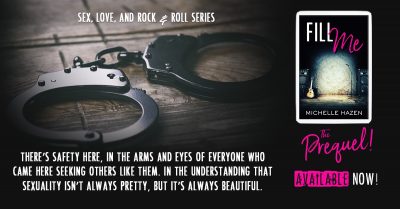
Ooh, how can you resist? Can you? I don’t think I can!
Grab your copy now! (And, as always, don’t forget to leave a review once you’ve read it. Need a place to post a review? Drop me a note. I’ll help.)
Amazon
Barnes & Noble
Kobo
iTunes
Goodreads
Yay! It’s not exclusive to only one retailer!
Connect with Michelle (I keep telling you guys how awesome she is on Twitter. Are you listening? Join the conversation!)
Website
Twitter
Faceboo:
Newsletter sign up
Goodreads
Pinterest
January 15, 2018
 Let’s welcome SD Hintz to West of Mars!
Let’s welcome SD Hintz to West of Mars!
Honestly, I don’t know how SD found us, and I’m more than okay with that. I love adding new people to my radar, as you long-time readers well know. Of course, my wish list of books I want to get my hands on grows exponentially, and sometimes, so does my TBR mountain range, but even that’s worth it. I’ve found some fantastic stuff from what you guys ask me to feature. And that’s only one reason why I do this!
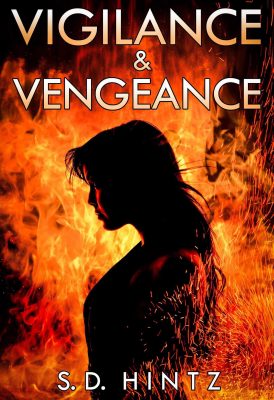
So, SD, what song makes you think of Vigilance and Vengeance?
That was all SD had to say, but if you really listen to the song, you’ll understand it. Of course, it’ll help if you know what the book’s about.
Eighteen-year-old Seanna had a face that was hard to forget. A blood red birthmark emblazoned across her chin is the reason why. It made her the target of taunts from bullies and the bane of the headmistress of the orphanage where she lived since birth. Her mark possesses a fiery flair she struggles to control. Consumed by a pyrokinetic ability she can either learn to control it or let it control her.
In a world where no one can be trusted can she trust herself to save the world or will she be the one to end it?
Pick up a copy — this has a great premise, doesn’t it? And I like the song; Unspoken is a new-to-me band. It’s happy. It’s got great energy. What a contrast to a book about a pyrokenetic!
Unfortunately, this is an Amazon-only book, but if that’s your juju and you have Unlimited, you can download and read away. The rest of us will have to either cough up real money (what a horror! To pay money for a book!) or wait and hope our libraries or other retailers will carry it.
Connect with SD Hintz! You know you want to be around someone this creative.
Twitter
Facebook
Goodreads